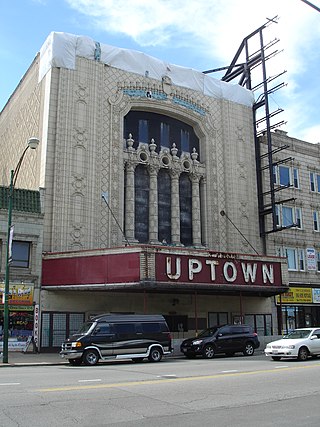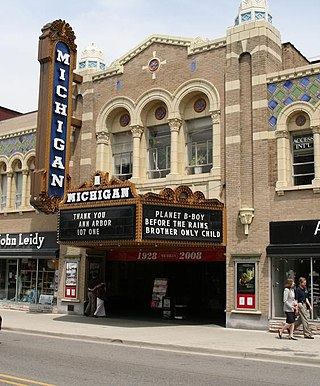
The Roxie Theater, also known as the Roxie Cinema or just The Roxie, is a historic movie theater, founded in 1912, at 3117 16th Street in the Mission District of San Francisco. It is a non-profit community arthouse cinema.

A grindhouse or action house is an American term for a theatre that mainly shows low-budget horror, splatter, and exploitation films for adults. According to historian David Church, this theater type was named after the "grind policy", a film-programming strategy dating back to the early 1920s which continuously showed films at cut-rate ticket prices that typically rose over the course of each day. This exhibition practice was markedly different from the era's more common practice of fewer shows per day and graduated pricing for different seating sections in large urban theatres, which were typically studio-owned.

The Carolina Theatre is a performing arts and cinema complex in downtown Durham, North Carolina. The facility is operated by a nonprofit organization named The Carolina Theatre of Durham, Inc. under a management agreement with the City of Durham, which owns the complex.

A movie palace is any of the large, elaborately decorated movie theaters built between the 1910s and the 1940s. The late 1920s saw the peak of the movie palace, with hundreds opening every year between 1925 and 1930. With the advent of television, movie attendance dropped, while the rising popularity of large multiplex chains in the 1980s and 1990s signaled the obsolescence of single-screen theaters. Many movie palaces were razed or converted into multiple-screen venues or performing arts centers, though some have undergone restoration and reopened to the public as historic buildings.

The Michigan Theater is a movie palace in Ann Arbor, Michigan, United States, near the Central Campus of the University of Michigan. It shows independent films and stage productions, and hosts musical concerts.

The Detroit Opera House is an ornate opera house located at 1526 Broadway Street in Downtown Detroit, Michigan, within the Grand Circus Park Historic District. The 2,700-seat venue is the home of productions of the Detroit Opera and a variety of other events. The theatre was originally designed by C. Howard Crane, who created other prominent theatres in Detroit including The Fillmore Detroit, the Fox Theater and the Detroit Symphony's Orchestra Hall. It opened on January 22, 1922.

The State Theatre is a movie theater in Traverse City, Michigan. In its current iteration, it is operated by the Traverse City Film Festival, and presents a year-round schedule of film and live performances.

The Temple Theatre is a historic theater, located on the banks of the Saginaw River in Saginaw, Michigan. The Temple was built in 1927 for the Elf Khurafeh Shriners, and operated for 50 years by W. S. Butterfield Theatres. The theatre complex also contains the former clubhouse of the Elf Khurafeh Shrine, now in use as event space.

The State Theatre is a single-screen movie theater located in Bay City, Michigan. Built in 1908 during the booming lumbering era in Michigan, the State Theatre was originally known as the Bijou, and was one of the many vaudeville and burlesque houses in Bay City. In 1930 the theater was renovated and reopened as the "Bay." The ownership and the name of the theater changed over the years until July 2000, when the theater was purchased by the Bay City Downtown Development Authority who restored the Mayan motif marquee.

The Mall of Monroe, formerly known as Frenchtown Square Mall, is an enclosed shopping mall in Frenchtown Charter Township in the U.S. state of Michigan. It is located just north of the city of Monroe along North Monroe Street (M-125). Opened in 1988, the mall features more than thirty tenants and a church. The mall is managed by Cafaro Company of Youngstown, Ohio. The mall's anchor stores are Planet Fitness, Phoenix Theatres, and Domka Outdoors. There are 4 vacant anchor stores that were once Target, Sears, and Pat Catan's.

The Vista Theater is a theatre located at 218 Iron Street in Negaunee, Michigan. It was listed on the National Register of Historic Places in 2005.
The performing arts in Detroit include orchestra, live music, and theater, with more than a dozen performing arts venues. The stages and old time film palaces are generally located along Woodward Avenue, the city's central thoroughfare, in the Downtown, Midtown, and New Center areas. Some additional venues are located in neighborhood areas of the city. Many of the city's significant historic theaters have been revitalized.
Emagine Entertainment Inc. is an American movie theater chain based in Troy, Michigan, operating 28 cinemas in Michigan, Illinois, Indiana, Minnesota, and Wisconsin. Emagine is ranked as the 9th largest theatre chain in North America.

The Capitol Theatre Building is a cinema and concert venue located at 140 E. 2nd St. in Flint, Michigan. Designed by John Eberson, it is an atmospheric theater designed to look like a Roman garden. The Capitol Theatre opened in 1928, and operated as a cinema and live performance venue until 1996. The theatre was listed on the National Register of Historic Places in 1985.

David Robert Mitchell is an American film director and writer. He received significant recognition as a director after completing his second feature, the critically acclaimed horror film It Follows (2014).

The State Theatre is a Spanish-styled atmospheric theatre in Kalamazoo, Michigan, designed by renowned architect John Eberson. The State was built for W.S. Butterfield Theatres in 1927, and remains in operation today, presenting live shows. The theatre was listed on the National Register of Historic Places in 2021.
W. S. Butterfield Theatres, Inc. was an operator of vaudeville theaters and later movie theaters in the Lower Peninsula of Michigan. Beginning in the early 1900s, "Colonel" Walter Scott Butterfield expanded his business from one vaudeville house in Battle Creek in 1906 to 114 cinemas across Michigan in 1942. The Butterfield circuit was reduced to 21 theaters by 1984, when it was sold to George Kerasotes.

The Maltz Opera House is a theater in Alpena, Michigan, named after Alpena banker George L. Maltz. The Maltz is currently under restoration to its 1930s-era appearance, and is expected to be listed on the National Register of Historic Places.
The State Theatre is a movie theater in downtown Benton Harbor, Michigan. The State opened on May 14, 1942, operated by W. S. Butterfield Theatres. Butterfield sold the State in 1967, and it closed in 1974.

The Martha Washington Theatre is a former movie theater in Ypsilanti, Michigan. The Martha Washington was built and initially operated by Florence W. Signor of Ypsilanti, the only woman theatre operator in Michigan at the time. Signor sold the Martha Washington to W. S. Butterfield Theatres of Detroit in 1925, which operated it as a first-run cinema until the 1970s.



















